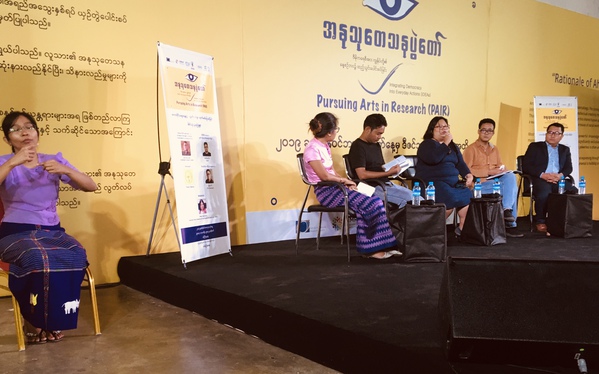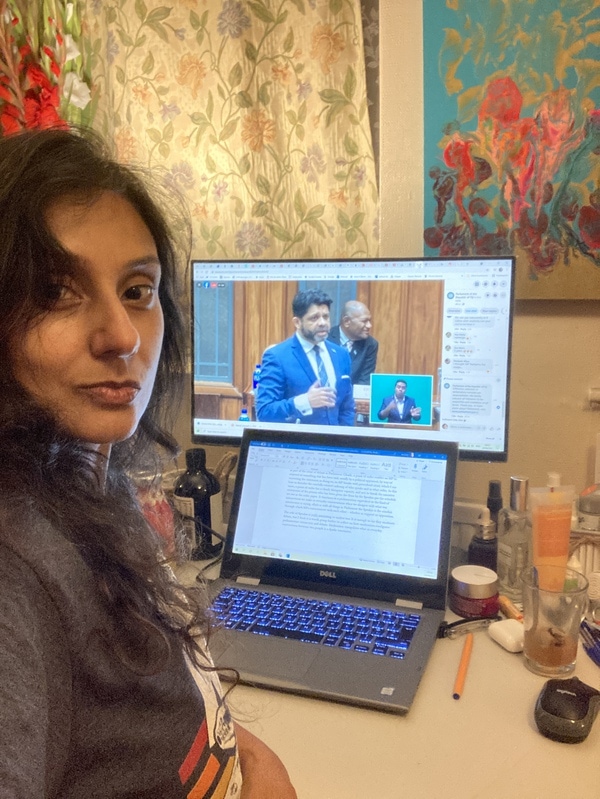As a rule, here at Allegra, we as editors emphasise our collectiveness. Rightly so: There is very soft division of labour, there is no hierarchy, and we strive for consensus in all matters. We have nominal editors-in-chief, but that effectively only means that these are the people currently reading the emails accumulating at the submissions@allegralaboratory.net account (keep ‘em coming!).
Still, we are individuals who have signed up for this, and some eventually move on, and some eventually join. It is not in fact the case that we are massively underworked and couldn’t do with support and fresh blood. (Shoutout to our editorial assistants at this point who go above and beyond the call of duty every bloody week.) It’s in that spirit that we want to open a window onto the collective by introducing our newest-most member, Jastinder Kaur!
Some of you will know her from elsewhere and some from the awesome resonance cast on coups that she participated in here on Allegra a little while ago. She has for a while already been increasingly involved in our activities, including collectively written posts, and we are all looking forward to how Jas will fill in her role and shape our collective in the future. Say “Hi, Jas” if you get the chance!
Self-introductions are tricky, but here we go – Jas in her own words:
I am a second generation working-class British Indian woman. These perspectives, experiences, and positionalities frame much of my work as a political anthropologist, bringing into ethnographic focus the dynamic and fraught interplay of identity, culture, conflict, conviviality, belonging, and exclusion at the intersection of individual, group, and state; and especially in post-colonial multi-ethnic societies.
I do revel in being a bit of an anthropological interloper and occupying intellectual and research spaces often traditionally closed to the discipline, such as the study of coups d’etat and parliaments. But I do so from a position of radical optimism about the possibilities that open up when we push boundaries and collaborate across them, even (perhaps most critically) in the midst of critical events and despite our differences – but I also carry with me a large dose of pessimism about how we change the structures that oppress and silence us.
Trying to be part of a movement to overcome this tension has led me to help create international research coalitions with colleagues across Ethiopia, Myanmar, and the UK. It’s the same spirit of collective critical thinking and action – and the hope implied in that – that has led me to Allegra. What I find here that excites me is a space and a set of allies that challenge me to imagine and pursue hopeful futures in the present while speaking truth to power. If I were a cartoon character, I’d be Scrappy from Scooby Doo – small but always up for fighting the bad guys! Oh, and if you hadn’t guessed already…. I write incredibly loooong sentences, so keep pushing back on that, and I’ll keep learning!

With artists and researchers at the’Reducing Inequalities in Political-Public Engagement’ (RIPE) festival, at The Secretariat, Yangon, Myanmar. December 2019.
But wait, there is more!
- What kind of anthropologist are you?
The kind that, following Tim Ingold, is immersed in philosophy with people in it. Also the kind that people outside or academia think makes me an archaeologist, which to be fair isn’t far off. So, for example, studying lived experiences and meaning-making around coups in Fiji took me (inevitably as I see it now) into both the past and the future. - What keeps you up at night?
During the pandemic era moratorium on older ways of doing fieldwork, what’s kept me up at night has been my postdoctoral research tracing the entanglements between Parliament, politicians, and people in Fiji as they occur in real time, i.e., across a 12hr timezone difference. Other than that, complete and utter silence at night bewilders me – how does anyone sleep surrounded by the sound of silence?! So thank goodness for the foxes and their midnight antics! Also, thinking about jumping in my (non-existent) MG or Ford Mustang Fastback and driving through the night to meet the sun! - What makes you hopeful?
It has been a long time coming but I’m finally working on my relationship to hope. And being invited to join the Allegra editorial collective has been a serendipitous moment in that process. It helps when you’re amongst Allies who are weird and wonderful, and with whom you feel kinship – the kind where it’s possible (along with the lovely aspects we associate with kinship) to be robust, be a little discomfited and discomfiting, and not take yourself too seriously or feel pressured to self-represent in certain ways. Some of the international research coalitions I’ve been part of with colleagues in Ethiopia and Myanmar, prior to my postdoc, have also given me hope that issues around who can do research, who gets access to vital resources and funding to do research, and who gets to represent whom, can be radically reoriented and made more inclusive. So I guess what makes me hopeful is being able to imagine the world and my part in it differently – and to approach this through relations of care and optimism. Also, that my beloved team won the league for the first time in decades made me hopeful that good stuff can happen… you just have to wait a little life-time sometimes. And then suddenly you’re champions of the world. - What was your most memorable cup of tea?
I once invited the Fiji secret branch personnel who were put onto me as a British spy in for tea; it was 4pm after all. I can be incredibly cool under pressure – but only when life and liberty are at stake.



